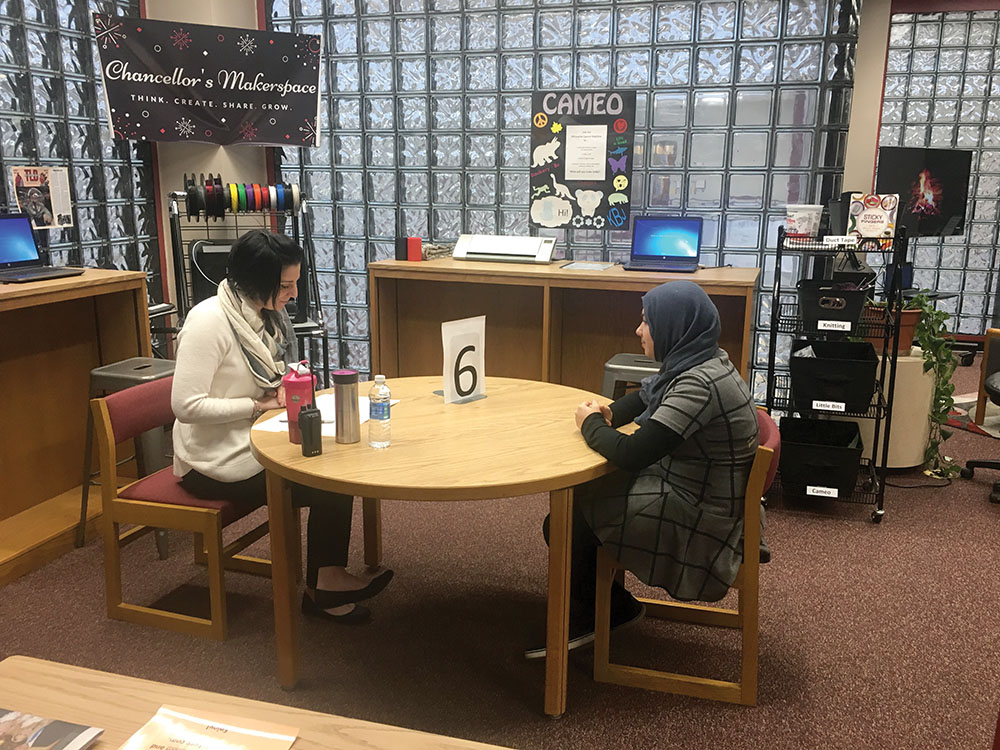A School Librarian's Mock Interview Program Preps Teens for “Face Time”

A mock interview in progress at the Chancellor High School library. Photo courtesy of Kristy Jett-Brown
Librarian Kristy Jett-Brown heard the same story from friends in the business world—young people come in for interviews with good résumés but poor face-to-face communications skills. With those conversations fresh in her mind, she watched as her son prepared for numerous oral presentations in college and listened to nervous high school students worrying about the unknown of upcoming college and job interviews. Putting it all together, she identified a need.
“While digital technology is great, and we want students to be very literate in 21st-century digital skills, maybe the one thing that we’re really lacking in education right now is an emphasis on real-time, face-to-face interaction—just conversation skills,” she says.
To fill that gap, Jett-Brown created a mock interview program for her students at Chancellor High School in Fredericksburg, VA. She invited friends from the business world, as well as district administrative staff, to act as the interviewers and fill out a feedback sheet for the students.
“We want them to be well-prepared when they leave us, whether going into the workforce or into the academic world and college,” she says. “The mock interviews would help them with either direction they take.”
Freshman Amirah Ahmed agrees that she and her peers need to develop these skills—and welcomed the opportunity.
“Nowadays, especially my generation, we’re all on our phones and on the Internet, we don’t interact as much face-to-face, so I feel like this could help a lot,” says Ahmed, one of the few underclassmen to sign up for the program.
Still too young to get a teen work permit, Ahmed hopes to babysit or find a volunteer position this summer. She feels more prepared now.
“It gave me insight into what future interviews for me might be like,” she says. “I feel like I know what’s expected.”
Anyone who signed up for the program—Jett-Brown reached the maximum of 25 students (limited by space constraints)—also had to come to a preparatory class. There, Jett-Brown went over what questions might be asked, how to introduce themselves, what to say at the end of the conversation, and some interviewing basics:
• Be well-rested
• Turn off your phone
• Be engaged and enthusiastic
• Be aware of body language
• Make eye contact
“[The interview] showed me what my strengths are and what I need to work on,” Ahmed says. “It’s not as stressful as you think it would be. You get stressed out and nervous, but as long as you’re prepared and you just relax, you’ll be fine.”
RELATED
The job outlook in 2030: Librarians will be in demand
The job outlook in 2030: Librarians will be in demand
ALREADY A SUBSCRIBER? LOG IN
We are currently offering this content for free. Sign up now to activate your personal profile, where you can save articles for future viewing





Add Comment :-
Comment Policy:
Comment should not be empty !!!
Kristy Jett-Brown
The approach you mentioned is the same one that we took at Chancellor High School. We recruited local business leaders and school leaders to serve as the mock interviewers. I agree that it is important to have individuals with authentic experience serve in the interviewer role. The only play acting involved was during role play sessions with students in the preparatory class. Libraries should be a central location for college and career readiness activities and resources for students! It is the perfect place to encourage students to perfect their interview skills. 😊Posted : Jul 06, 2018 12:59
Penelope Librarian
We do the same program at my school under the auspices of the Guidance office, and have community volunteers who run businesses come in to do the mock interviews. In that way, students are exposed to actual hiring people and decision makers, instead of having a librarian play-act at being a hiring decision maker. The guidance office typically had no trouble in getting local business leaders to volunteer for a couple of hours, since they see it as a way to give back to the community. I would think the Guidance Departments of schools would be better at this function than libraries. Still, no matter who does this, it is good for students in a direct, non-partisan, well-grounded way.Posted : Jul 05, 2018 11:53